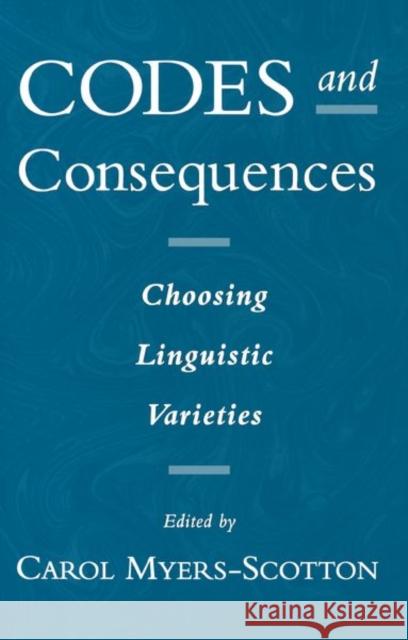Codes and Consequences: Choosing Linguistic Varieties » książka
Codes and Consequences: Choosing Linguistic Varieties
ISBN-13: 9780195115239 / Angielski / Miękka / 1998 / 232 str.
Codes and Consequences: Choosing Linguistic Varieties
ISBN-13: 9780195115239 / Angielski / Miękka / 1998 / 232 str.
(netto: 614,16 VAT: 5%)
Najniższa cena z 30 dni: 468,63
ok. 16-18 dni roboczych.
Darmowa dostawa!
This collection of essays considers how messages of intentionality are conveyed by choosing one style of English over another. While these choices are not necessarily conscious, implicit in the communicative competence of a speaker, performer, or writer is an awareness of the consequences of their choice of linguistic code. Messages of intentionality thus go beyond the referential content of the conversational turn, performance, or literary work. Intentions refer to everything from attitudes toward the subject matter to the presentation of the speakers persona in relation to the topic or audience. In this way, linguistic choices serve as a tool for the speaker or author and simultaneously as an index used by the audience to find these implied communicative goals.
The contributors examine this phenomenon, known as codeswitching, in situations ranging from translations of the Bible to surprise in poetry to supervisor-worker interactions on the automobile assembly line. A major theme throughout this volume is how the construct of markedness is utilized in codeswitching. Developed to varying degrees among these papers is the notion that speakers and writers, as rational actors, exploit the unmarked-marked opposition regarding audience expectations. Claims in many of these chapters follow the Markedness Model, Myers-Scottons explanation of linguistic choices. Under this model, the use of a particular code displays an intentional meaning that is viewed in terms of the extent to which the codes use matches community expectations, given the social situation or genre involved.
A wide array of subjects, from novels to family conversations at a holiday gathering, are discussed in these essays, making this volume of interest to linguists specializing in such areas as discourse analysis and sociolinguistics, as well as scholars and students of English literature and rhetoric.











